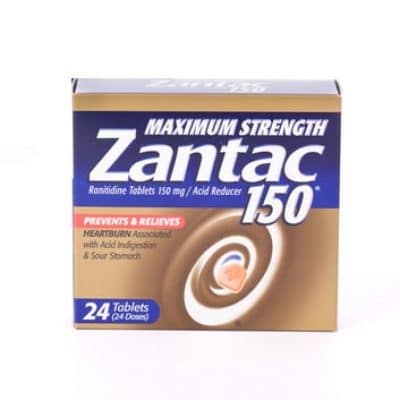Zantac Attorneys
Zantac and other ranitidine-based medications are taken by millions of people every year to combat heartburn, GERD, stomach ulcers, and other conditions associated with too much stomach acid.
Zantac and other drugs made with ranitidine were found to contain nitrosamine impurities called N-Nitrosodimethylamine, or NDMA. NDMA is a known carcinogen, or substance that can cause cancer.
Home » Defective Drug Attorneys » Zantac Attorneys
Many companies have issued voluntary recalls of their ranitidine products, including Sanofi, which produces Zantac. The FDA has instructed companies that find their ranitidine-based products contain more than an acceptable level of NDMA to recall those products.
If you or someone you are close to takes Zantac or another ranitidine-based drug and is now suffering from cancer, you may have a case. The NDMA in Zantac and other ranitidine medications has been linked to a variety of different kinds of cancer. Many of these drugs, including Zantac, are now facing recalls due to the presence of NDMA.
Contact Farah & Farah now for a free consultation. You don’t pay anything unless your case is successful. Don’t hesitate to let us fight for the justice and compensation you deserve.

What Is Zantac?
Zantac is the brand name of ranitidine produced by the company Sanofi and is an antacid and antihistamine used to treat heartburn, acid reflux, GERD, stomach ulcers, and other conditions associated with too much stomach acid. It’s classed as an H2 antagonist, or H2 blocker, which decreases the amount of acid in the stomach by blocking histamine in the stomach’s parietal cells. Zantac may require a prescription, but can sometimes be purchased over-the-counter.
More than 15 million prescriptions for Zantac are written by doctors annually.
What Is an H2 Blocker?
An H2 blocker, or H2 antagonist, is a type of medicine that is designed to reduce the amount of acid produced within the stomach. Many of the conditions that an H2 blocker is designed to treat involve too much stomach acid. For example, heartburn, stomach ulcers, or acid reflux. When the amount of stomach acid produced is reduced, there’s less that can travel back up the esophagus as acid reflux to cause heartburn.
H2 blockers work by blocking any action of the histamine receptors in the stomach’s parietal cells. In fact, the H in H2 stands for histamine. A parietal cell is a cell in the stomach responsible for the production of hydrochloric acid. Parietal cells receive stimuli from three sources and will produce acid as a response to any of the three: histamine, gastrin, and acetylcholine.
Histamine is the greatest contributor to the parietal cells’ acid production. What Zantac and other ranitidine drugs do is to block the H2 histamine receivers on the cells from acting so they don’t produce additional acid. This is to reduce the amount of acid produced in the stomach.
Are There Other Brands of Ranitidine?
Zantac isn’t the only drug that is a form of Ranitidine. There are other brands of ranitidine on the market that have been subject to the same recalls as Zantac. Available brands of ranitidine on the market include the following:
- Zantac
- Zantac 75
- Zantac Maximum Strength
- Wal-Zan 75
- Heartburn Relief (ranitidine)
- Acid Reducer (ranitidine)
- Acid Control (ranitidine)
What Does Zantac Treat?
Zantac and other brands of ranitidine-based drugs are used to treat ailments caused by too much acid in the stomach. These can include:
- GERD (gastroesophageal reflux disease)
- Heartburn
- Stomach ulcers
- Other conditions causing too much stomach acid
What Is Heartburn?
Heartburn is a sensation of burning that feels located behind the breastbone, generally near the heart. The condition is not associated at all with the heart, so its name comes instead from where the symptoms appear to be located. Heartburn is often made worse by eating food, lying down, or bending over. It also tends to be worse in the evenings.
Heartburn isn’t always a cause for concern. Some people suffer from it occasionally but can manage the symptoms with over-the-counter medication or with changes to their lifestyle. If heartburn is frequent, or if it affects daily life, that’s when a visit to the doctor and a prescription for stronger medication may be required.
SYMPTOMS AND CAUSES OF HEARTBURN
The most common symptoms of heartburn are:
- A sensation of burning in the chest (before and/or after eating)
- Acidic or bitter taste in the mouth
- Pain made worse by bending over or lying down
Heartburn is caused by stomach acid backing up into the esophagus, which is the tube that carries food and liquid from your mouth to your stomach. The lower esophageal sphincter is a muscle band at the top of the stomach and bottom of the esophagus that loosens to allow food and drink to enter your stomach but tightens to prevent anything from coming back up the other way. Heartburn occurs when the lower esophageal sphincter is too loose, allowing stomach acids to creep back up the esophagus, causing the burning sensation in the chest.
If your symptoms include the following, you should see your doctor:
- Heartburn more than twice weekly
- Over-the-counter medications don’t ease symptoms
- Swallowing is difficult
- Weight loss from either loss of appetite or difficulty in eating
- Frequent vomiting or nausea
Heartburn can be triggered by a variety of things, which vary depending on the person. In addition to the normal triggers, being either pregnant or overweight can increase the chances of heartburn. Potential heartburn triggers include:
- Chocolate
- Alcohol
- Fried or fatty foods
- Spicy foods
- Tomato-based products, including ketchup
- Citrus
- Onions
- Peppermint
- Large meals or overly fatty meals
- Coffee or other beverages containing caffeine
- Alcohol
- Carbonated beverages

What Is GERD?
GERD stands for gastroesophageal reflux disease. Although similar in nature to heartburn, GERD is more severe. People suffering from GERD experience acid reflux (the backwash of stomach acid that makes its way into the esophagus or even up to the mouth) frequently. The stomach has a lining designed to withstand the hydrochloric acid that’s produced there to break down food. The esophagus doesn’t, so any stomach acid that makes its way up into the esophagus can irritate the esophagus’ lining.
Although it’s normal to experience some acid reflux from time to time, GERD sufferers have more severe acid reflux at least once a week, but possibly more often than that. Some GERD sufferers can manage their symptoms with lifestyle changes or medicine purchased over-the-counter. Some, however, require stronger, prescription medication to deal with the symptoms.
SYMPTOMS AND CAUSES OF GERD
Common symptoms of GERD include:
Heartburn after eating and/or at night
- Pain in the chest
- Swallowing difficulty
- Regurgitating sour liquid or food
- Feeling of a lump in the throat
Nighttime acid reflux can cause additional symptoms, including:
- Interrupted sleep
- Chronic cough
- Laryngitis
- Asthma
Similarly to heartburn, GERD occurs when the lower esophageal sphincter is abnormally loose or has been weakened and doesn’t prevent stomach acid from backing up the esophagus as it should. GERD is more severe than heartburn, as it occurs more frequently and more severely. The more frequent acid reflux irritates the lining of the esophagus.
These factors can increase your chances of developing GERD:
- Pregnancy
- Obesity
- Hiatal hernia
- Scleroderma and other connective tissue disorders
- Stomach emptying delay
In addition, these factors can aggravate already-present symptoms of GERD:
- Eating late at night
- Eating large meals
- Smoking
- Drinking alcohol or caffeinated beverages
- Eating fried or fatty foods
- Taking medications such as aspirin
COMPLICATIONS OF GERD
GERD can also have long-term complications because it can cause long-term esophageal inflammation. These complications can include:
- Esophageal ulcers: Open sores caused by stomach acid eating away at the lining of the esophagus.
- Esophageal stricture: The narrowing of the esophagus caused by a buildup of scar tissue from stomach acid damage to the esophagus.
- Barrett’s esophagus: An increased risk of esophageal cancer caused by changes made to the esophageal tissue lining by stomach acid.
What Are Stomach Ulcers?
Stomach ulcers are open sores that can develop in the lining of the stomach. They can occur when the lining that protects your stomach from the digestive acids is worn away or otherwise reduced. The acid then eats away at the stomach lining, causing the ulcers.
SYMPTOMS AND CAUSES OF STOMACH ULCERS
Stomach ulcers can have the following symptoms:
- Heartburn
- Acid reflux
- Weight loss
- Stomach pain
- Vomiting and nausea
- Bloody vomit or vomit that has the appearance of coffee grounds
- Dark and tar-like stools
- Bloating
- Feeling full easily
- Pain that improves with antacids or eating
Potential Side-Effects of Zantac
As with any medication, there are potential side effects of taking Zantac and other ranitidine-based medications. Some of the potential side-effects of taking Zantac are:
- Loss of appetite
- Stomach pain
- Jaundice
- Dark urine
- Faster or slower heart rate
- Easy bleeding or bruising
- Shortness of breath
- Coughing with mucus
- Chest pain
- Chills
- Fever
- Skin or hair problems
- Or more…

These are some of the more common side-effects of taking Zantac. Anyone prescribed Zantac who experiences serious symptoms is recommended to stop taking Zantac right away and to immediately contact their doctor.
Pneumonia
Zantac can increase the risk of pneumonia. The symptoms of pneumonia include:
- Chest pain
- Fever
- Shortness of breath
- Coughing up yellow or green mucus
Heart Attack
Zantac isn’t known to be associated with an increased risk of a heart attack. However, the symptoms of a heart attack can often be mistaken for those of heartburn. Anyone experiencing chest pain in addition to general ill feelings, sweating, heavy feeling, nausea, and pain in the arm and shoulder should seek medical attention immediately.
The FDA’s Discovery of NDMA
In 2019, the FDA discovered that Zantac and other ranitidine-based drugs contained an impurity of nitrosamine, N-Nitrosodimethylamine, or NDMA. NDMA is a known carcinogen, or cancer-causing substance. NDMA is found in drinking water and food, but at such low levels that the FDA does not consider it a risk. The acceptable amount of NDMA that can be present in drinking water, according to the EPA (Environmental Protection Agency), is 7 ng/L.
At that time, Canada and France issued recalls of Zantac and other ranitidine brands, while the European Union as a whole and the United States investigated the potential risk. In September of 2019, CVS suspended the sale of Zantac and its own brand of ranitidine out of caution, even though at the time, no recalls had been issued and the FDA was not recommending that patients stop taking the medication immediately.
The FDA did, however, recommend that anyone taking a ranitidine-based drug should contact their doctors about non-ranitidine options.
Testing for NDMA
The FDA found that a third-party laboratory that tested ranitidine for impurities in the nitrosamine was using higher temperatures in its testing procedures. Although these temperatures did not exceed acceptable ranges, they did produce more NDMA than other methods. The FDA’s recommended testing method liquid chromatography-high resolution mass spectrometry (LC-HRMS) test instead. The LC-HRMS method doesn’t use higher temperatures and produces lower rates of NDMA.
NDMA’s Links to Cancer
The International Agency for Research on Cancer lists NDMA as a probable carcinogen in humans. This means that NDMA has, in testing, been found to cause cancer in rats and other animals and therefore carries the risk of also causing cancer in humans in amounts above a certain quantity.
Exposure to NDMA has been linked to the following types of cancer:
- Stomach
- Small intestine
- Esophageal
- Liver
- Colorectal
Additionally, but less frequently, NDMA exposure has also been linked to the following cancers:
- Pancreatic
- Early-onset prostate
- Leukemia
- Multiple Myeloma
- Non-Hodgkin’s Lymphoma
Recalls of Zantac
Throughout 2019, many resellers of Zantac and ranitidine have ceased sales of the drugs out of caution, even when companies had not issued their own voluntary recalls and the FDA had not yet instructed companies to issue recalls. In the United States, these resellers included CVS, Walgreens, Walmart, and Rite Aid.
Since then, many manufacturers of ranitidine-based drugs have voluntarily recalled their products. In October of 2019, Sanofi, the manufacturer of Zantac, voluntarily recalled Zantac OTC, its over-the-counter version. By February 27 of 2020, the FDA had advised all manufacturers of ranitidine-based drugs to recall them if they were found to contain more than 96 nanograms of NDMA per dose. 96 nanograms of NDMA is the daily intake found to be acceptable by the FDA.
Other companies, in addition to Sanofi, that have voluntarily recalled their ranitidine products are:
- American Health Packaging
- Novartis
- Sandoz
- Apotex
- Appco Pharma LLC
- Northwind Pharmaceuticals
Not all drugs containing ranitidine have been recalled, however. The FDA advised companies to recall all of those that contain more than 96 nanograms of NDMA per dose, but others may still be on the market.
Zantac Lawsuits
There have been multiple lawsuits filed since the FDA issued its advisory. A group of lawsuits in South Florida has now been consolidated into a multidistrict lawsuit. In addition, a class-action lawsuit in California against both Sanofi and Boehringer Ingleheim has accused the company of knowing about the dangers of NDMA in ranitidine but failing to warn the public of those dangers. Unlike other drugs that have risks of NDMA, like Valsartan, with Zantac and other ranitidine drugs, the NDMA forms within the body rather than being contained within the medication itself, according to the lawsuits.
Should I Consider a Zantac Lawsuit?
If you have used Zantac once a week for at least one year between 2000 and the present and have developed one of the following cancers as a result, you may have a case:
- Bladder Cancer
- Esophageal Cancer
- Gastric/Stomach Cancer
- Liver Cancer
- Pancreatic Cancer
You’ll need to consult with your doctor and obtain your medical records in order to prove that your cancer was caused by taking Zantac. Then, the next step is to consult with an attorney.

Farah & Farah’s attorneys are experienced and highly trained in defective drug lawsuits. We’ll schedule a free consultation with you to see if you may have a case against Sanofi or another drug manufacturer. There are only costs to you if your case is successful. Contact us today – don’t wait to seek the compensation and justice you deserve.

free case review
Client Testimonials

Related Blogs







